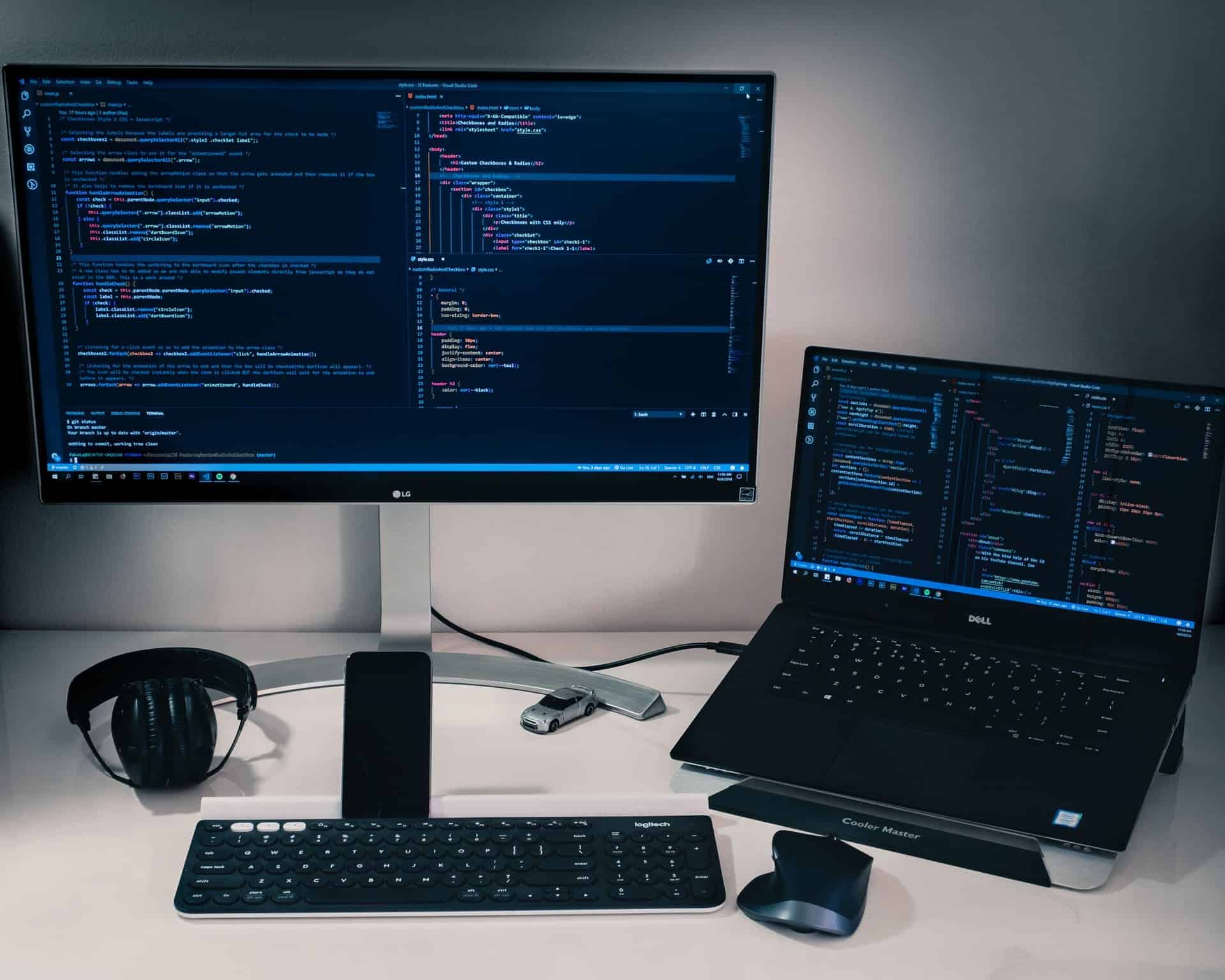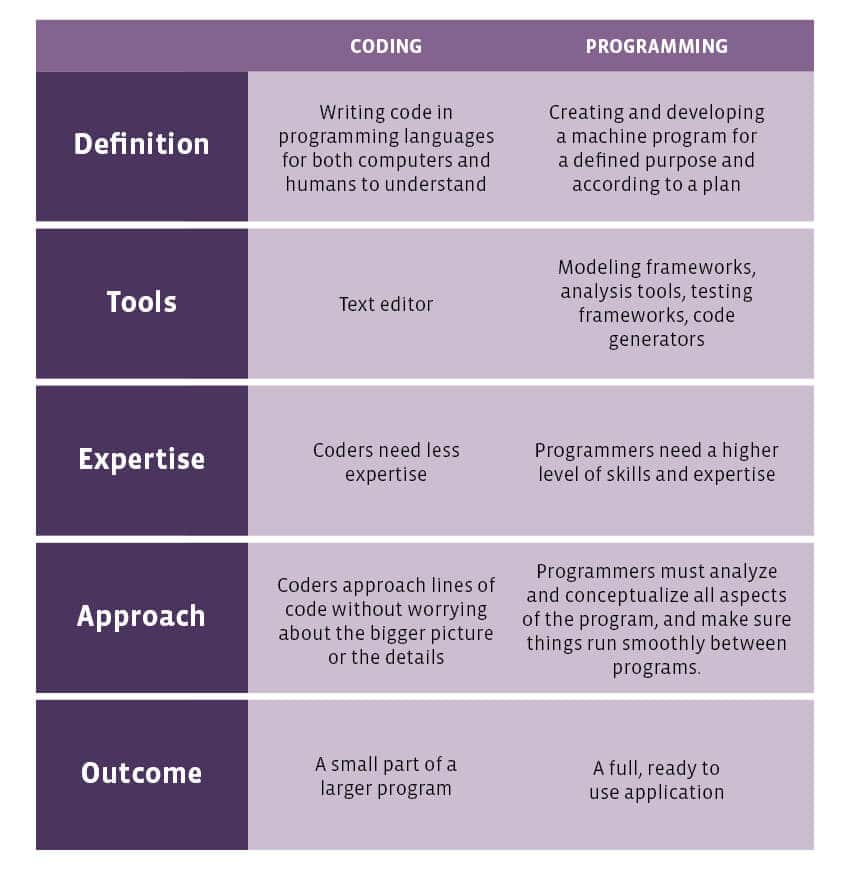Coding vs Programming: 5 Key Differences To Remember
Updated: November 28, 2024
Published: April 27, 2021

When you start digging into the world of development, you may hear both the terms, “coding” and “programming” thrown about. While these two words are often used interchangeably, they actually signify two very different things. So, what is the difference between coding vs programming? Read on to find out.

Photo by Pakata Goh on Unsplash
What is Coding vs Programming?
What is Coding?
The language that computers understand is code, and code has been made into several different programming languages that both humans and computers can understand.
Coding is writing the programming languages in a way that will get the computers to do what we want them to do. Lines of code are called a script, and scripts create a program.
To summarize, coding means writing many lines of code which will create a program.
What is Programming?
We know that to make a computer program, we need lines of code. But that’s not all that is needed. How do the coders know what to ask the computer to do? This is where the programmers come in.
Programmers plan, design, test, deploy, and do maintenance on the completed code and programs. Programming involves the bigger picture of creating an outline and structure to the program’s code, before the code is written. After the code is written, the programmer needs to make sure it works and maintains it over time.
The Difference Between Coding and Programming?

5 Key Differences Between Coding and Programming
Becoming a Coder is Easier Than Becoming a Programmer
Coding is the first step to becoming a developer and therefore it is much easier and simpler to start coding. There are many online courses to get you started on learning to code.
Programming, however, requires much more specialized knowledge and in many cases, a degree or work experience.
The Scope is Different
Coders are only responsible for a specific part of a program, and only in small pieces at a time. Programmers are responsible for the entire scope of the project, start to finish. From the planning stage, execution, and maintenance, programmers have a larger responsibility.
To Create is Part of Programming
Coders create as well, but it’s more of an execution of the programmer’s ideas. Therefore, it requires much more ideation, creation, and in-depth knowledge of a program to be a programmer than to be a coder.
Programming Uses Higher Level Thinking
Programming involves making analytical decisions, changes based on current updates, abstract solutions, and anticipating problems before they occur. These are all higher level thinking tasks. Whereas coding involves translating actions into code — a much more straightforward task.
Coding is a Chapter in the Book of Programming
Much like each sentence, word, and character make up a book, lines of code make up a program. Programming is creating a plot, an outline, the story and structure of the book, and coding is writing the parts that will make up the book.

Photo by Danial RiCaRoS on Unsplash
How Coding and Programming Work Together
Coding and programming must work together in order to make a successful program. They are both vital pieces to the puzzle.
First, a programmer plans the application from start to finish, then the coder translates those plans into code. The programmer puts all of that code together, tests it, and creates the final product.
How to Get Started with Programming and Coding
It’s not hard to get started, you just need to be motivated and have a goal!
– What Exactly is a Coding Language, and Which to Start With
Coding languages are the same as programming languages. Software, games, programs, apps, networks, and websites are all written in a programming language, and there are different languages for different programs. You should research which languages are used in the field you want to enter and start there.
– How Long Does It Take to Learn Coding and Is It Difficult?
Coding does require time and skill to learn. Coding languages are a completely new way to think, and may take some time to understand.
However, if you have a logical and analytical mind, you can catch on to coding quickly. Each language is different and has different levels of expertise to master. Depending on how much time and effort you put into learning to code, it can take longer or shorter to fully learn. But anyone can start writing simple codes today.
– What Programming Languages to Learn
Wondering which coding language to start with? That all depends on what you want to do with your coding skills.
If you are looking to get into web development, you will need to start with learning HTML. If you are looking to code mobile applications, you may want to learn Swift.
Generally, many start with learning Python and C++.

Photo by Kelly Sikkema on Unsplash
Online Coding and Programming Courses for Beginners:
University of the People: UoPeople is a US accredited, online university that has an entire tuition-free computer science degree. During the degree program, you’ll learn programming fundamentals, advanced programming, web programming, and comparative programming languages.
Coursera: Coursera has options for many types of courses of all lengths. Some introductory courses are free, but many are paid. You can take classes from universities through this site as well.
Udemy: This online learning platform also offers courses in all fields and has plenty of free courses for beginners in programming.
Khan Academy: This website has free materials for learning many academic subjects. It is a great resource for learning to code, and learning about computer science.
Codecademy: Codecademy is all about learning code. They have courses of all levels, prices, learning styles, and paces.
For a complete guide on how to start learning to code, check out our article here.
The Bottom Line
When it comes to coding vs programming, we hope this guide has given you a better idea of the differences between the two. The main thing to remember is that coding is a part of programming, and both are vital to software development and computer programming.
